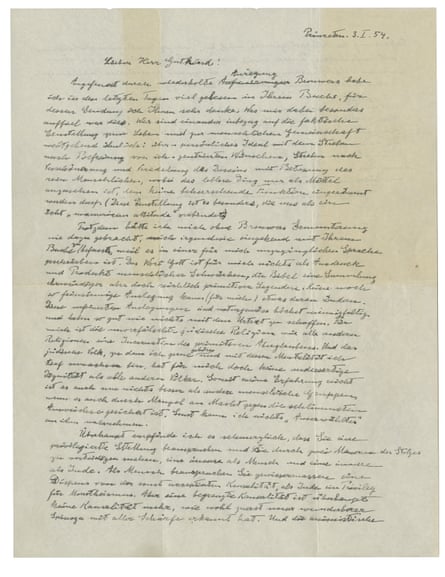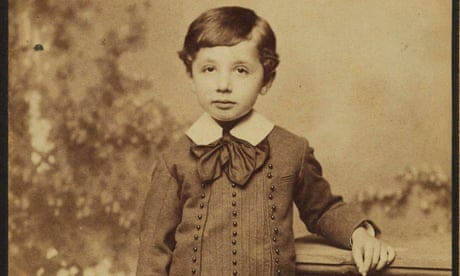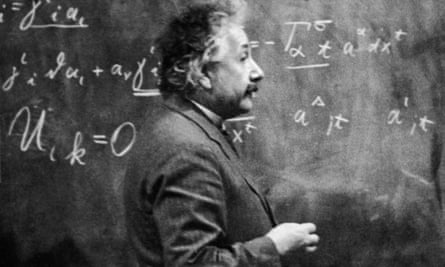GOD LETTER ALBERT EINSTEIN

Albert Einstein's 'God letter' reflecting on religion auctioned for $3m
A handwritten missive by Albert Einstein known as the “God letter” fetched almost $3m at auction on Tuesday.
Christie’s auction house in New York stated on Tuesday afternoon that the letter, including the buyer’s premium, fetched $2.89m under the hammer. That was almost twice the expected amount.

The one-and-a-half-page letter, written in 1954 in German and addressed to the philosopher Eric Gutkind, contains reflections on God, the Bible and Judaism.
Eric Gutkind the book Choose Life refuses to view man as more or less dominated by natural needs, and has only contempt for religious pragmatism, whether couched in psychological (“peace of mind”) or sociological (“the needs of the community”) terms. Man is a potential rebel in the universe, capable of choosing the “vertical way,” toward a fulfilment transcending nature and inexpressible in naturalistic terms. In what is perhaps the profoundest observation of the book, man is described as an “open” being, open toward the divine, and capable of infinite self-transcendence in love and perfection. Man does indeed experience evil and self-destruction; he suffers from enslavement to natural needs. But his suffering is mostly self-inflicted; it is the result of the wrong choice. “The perfect world can be accomplished here.”

Einstein says: “The word God is for me nothing more than the expression and product of human weaknesses, the Bible a collection of honourable, but still primitive, legends which are nevertheless pretty childish.”
The sentence has been hailed as evidence that the physicist, one of the 20th century’s most esteemed thinkers, was an atheist. But Einstein at times said he was not an atheist, and resented being labelled as one.
In the letter – being auctioned at Christie’s in New York on Tuesday – Einstein, a Jew, also articulates his disenchantment with Judaism. “For me the Jewish religion like all others is an incarnation of the most childish superstitions. And the Jewish people to whom I gladly belong and with whose mentality I have a deep affinity have no different quality for me than all other people,” he wrote.

“As far as my experience goes, they are no better than other human groups, although they are protected from the worst cancers by a lack of power. Otherwise I cannot see anything ‘chosen’ about them.”

The letter was written in response to a book by Gutkind, called Choose Life: The Biblical Call to Revolt.
The letter had been held among Gutkin’s papers, but it came up for auction in London in 2008. The evolutionary biologist Richard Dawkins was beaten in bidding that ended at £170,000.
Acknowledging his disappointment in failing to secure the item, Dawkins said: “This letter was about something very important to Einstein, I suspect.”
According to Einstein: A Life, a biography published in 1996, he was devoutly religious as a child. But at the age of 13, he “abandoned his uncritical religious fervour, feeling he had been deceived into believing lies”.

He said he believed in “Spinoza’s God” – referring to Baruch Spinoza, a 17th-century Dutch thinker – “who reveals himself in the lawful harmony of the world, not in a God who concerns himself with the fate and the doings of mankind”.
On another occasion, he criticised “fanatical atheists whose intolerance is of the same kind as the intolerance of the religious fanatics”.
Nick Spencer, a senior fellow at the Christian thinktank Theos, said: “Einstein offers scant consolation to either party in this debate. His cosmic religion and distant deistic God fits neither the agenda of religious believers or that of tribal atheists.
“As so often during his life, he refused and disturbed the accepted categories. We do the great physicist a disservice when we go to him to legitimise our belief in God, or in his absence.”
THINGS YOU MAY NOT KNOW: "The word 'God' is for me nothing but the expression and product of human weaknesses; the Bible a collection of honorable but still primitive legends which are nevertheless pretty childish," he wrote, according to a translation published in the Guardian, a British newspaper.
THINGS YOU MAY WANT TO SAVE: Letters you sent to Santa Claus & God.
ZENTRAVELER SAYS: Faith is likely to be described by Christians as a sacred, cherished, personal, serious part of their lives. After all, accepting what the Bible says, trusting in God's plan, and believing in Christ's death and resurrection all directly impact how Christians live.
From here to Infinity is a relatively short ride! The next leg takes eons and eons as you fly through the Barycentric Dynamical Time Zone! …and on and on and on. Follow the Zentraveler Newsletter often for Travel, Health and Zen-like stories and such. Where else can you get a THREE IN ONE NEWSLETTER FOR THE PRICE OF FREE.

ZENTRAVELER IS A PERSONAL NEWSLETTER, DESIGNED TO GIVE TRAVEL, HEALTH, WRITING AND HUMOR INCLUDING HELPFUL HINTS WITH A ZEN LIKE QUALITY.
PLEASE CHECKOUT MY NEW VIDEO PODCASTS AT ZENTRAVELER ON YOUTUBE...THANKS
